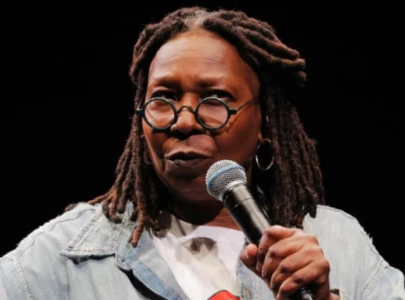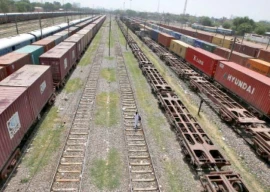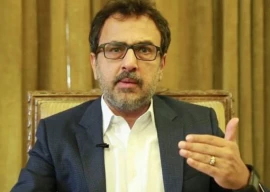In normal circumstances, this would be a gross image of catastrophic career decline. In Saima’s case, it represents another steep step in her upward trajectory through the international media landscape. As co-host for the new series of Horizons on BBC World News, her locust-crunching will be viewed by up to 300 million viewers around the world.
Not bad for a desi girl from south London. So how did she end up working for the BBC?
“It’s come full circle. I started with the BBC, working for radio.” Her route back to the beeb took in Channel 4 News (UK) and PBS (US). In Pakistan she is best-known as the presenter and arch-inquisitor on NewsEye, the prime-time show on DawnNews when the channel was in English.
Saima looks back on this fondly and beams with pride when people still ask her who was on the NewsEye team. Her direct style won many fans — and just as many detractors, who didn’t quite know what to make of this ballsy, no-nonsense young woman with an accent. “On NewsEye I got to be cheeky, a bit harsh at times ... but that was the aim.”
Asked if she had to tone down her natural personality for the BBC, she argues horses for courses. “It’s the nuances. The art of being a presenter is doing something that’s right for the programme, but doing it in a way that’s still you.”
But what defines ‘you’? “I like to call myself a pick-and-mix Pakistani. My upbringing was very split, between being very British in certain ways and very Punjabi and Pakistani in others.” Living in Karachi also opened her eyes to the country’s diversity. “Where I grew up, I only had knowledge of Pakistan through a Punjabi perspective.”
In person, Saima is self-deprecating in the British tradition. She is also friendly and open, traits more likely to come from her Punjabi side. Her persona on NewsEye was generally markedly different, often verging into the confrontational. This, one assumes, was the deliberate journalistic persona she adopted for the programme, but on Horizons she can “have more fun.”
The twenty-part series will look at “businesses that are developing solutions for the future.” With the world population expected to reach a staggering nine billion in a few decades’ time, feeding and housing the world have become the central questions for development economics. Horizons, which is essentially a business programme, looks at the inspired innovations which might solve these problems.
“Some of them are very basic, some of them incredibly high tech, but they will really change the way we live and work,” Saima says. Surely though, like most people, she has a wearied, pessimistic approach to ‘saving the world’ when confronted with the doom-and-gloom statistics which seem to point a much more likely way to apocalypse rather than utopia.
She shared this view at first, “but after the very first shoot, the team and I sat down at dinner … and we said, there really is hope.” Her experiences in countries such as Scotland, the Netherlands and Kenya ranged from the “mind-blowing” to the “heart-rending” and I sense this is more than marketing so that we watch her show. My word, the hard-nosed journalist has become a believer!
In San Francisco, she found a company turning human waste into plastic. Saima doesn’t elaborate on the secret alchemy — we will have to watch the show — but does thank her years in Karachi as preparation for surviving the smell.
In Kenya, the focus was more basic, but still capable of revolutionising lives. In terms of water usage, mobile money solutions can make root-and-branch changes in the economic structure, so that wells are better maintained and there is secure accountability — thus allowing those who previously had to walk twenty, thirty kilometres to get water to now receive it in their own village. “I met a woman who went back to college and is now a social worker.” Previously, the woman had spent all day walking miles and miles to fetch water and then walking the long journey back to bring it back home.
Telling these stories from these different locations sounds daunting. “I’ve never done a feature programme before, or a specific business show before. It’s a huge challenge, but I’m working with a professional organisation … it’s phenomonal to have that massive machine that works behind you.”
After this environment of expertise and professionalism, could she ever work in Pakistan again?
“Working for the BBC is a real privilege.” But she also acknowledges that Pakistan is, in many ways, where it’s at. After all, after the Osama bin Laden raid in May 2011, Saima found herself on six different networks, telling the story to people around the world. “Pakistan, as my friend says, is the story that keeps on giving.”
Her freelance career has allowed flexibility, after she let go of a staff job for the first time in her career. “Sometimes you have to feel the fear and take that leap of faith.” Things have worked out well, but will she return to Pakistan on a permanent basis?
“I have lots of plans for Pakistan,” she says with deliberate enigma. Does she mean politics? After laughter and thought for perhaps a beat too long, she replies with a firm no. “Once a journalist, always a journalist.”
And now to those locusts. In the Netherlands, scientists are figuring out alternatives to conventional farming, as a way of countering food scarcity. “They’re making the world’s most expensive burger,” Saima says, estimating the cost at 250,000 Euros. The reason for the colossal price? They’re making it out of a test-tube. “I did ask if it was halal,” Saima jokes.
And then they made her eat locusts — which are a great source of protein. How are they prepared? “You can have them dry, or in a stir-fry which is how I had them.” They weren’t bad, apparently.
Saima, who was off to India that night for the final leg of shooting, says she believes in being the best one can be, as “that’s what my family taught me”. For some Pakistanis, that will be more than good enough, as they tune in to watch what sounds like a fascinating series. For others, for whom Saima is not their cup of tea, well, they can always hope the ban on BBC World News comes back into action.
Published in The Express Tribune, Sunday Magazine, May 20th, 2012.
COMMENTS (4)
Comments are moderated and generally will be posted if they are on-topic and not abusive.
For more information, please see our Comments FAQ

1731550446-0/Polymarket-(1)1731550446-0-165x106.webp)

1729512368-0/liam-(8)1729512368-0-165x106.webp)
-(1)1718038311-0/SYDNEY-(1)-(1)1718038311-0-165x106.webp)


1730379446-0/WhatsApp-Image-2024-10-31-at-17-56-13-(1)1730379446-0-270x192.webp)









No doubt Saima ruled over the thousands of hearts when she was hosting News Eye , the main Current Affairs Programme of Dawn News and besides Pakistanis both English and American praised the way of her presentation on screen. Without any hesitation I believe that the success and fame she earned from News Eye is continuing through her new series of Horizons on BBC World News with great spirit.....
There is a real opportunity right now, for someone who is familiar with the nuances of the west and the complexities of a multi-ethnic desi society, to try and truthfully report the actual realities on the ground to both parties. Moreover, someone like Saima can use her background from the enlightened and educated west, to identify and cultivate priorities for us, that will help us deal with some of the seemingly intractable problems facing us today. . But that is probably too much of a commitment and hard work for one person, But I had hoped that Saima would stick around a little longer, to set some standards for Pakistani journalists, who are shutr-e-bey-mahaar right now. . Nothing but the best of wishes from this Pakistani, to Saima, in all her future endeavors. And thanks for your brief, but meaningful tenure on our TV screens. Hope you can come back and do some more, real soon.
Good going Saima
It is a big achievement. Well done and keep it up.